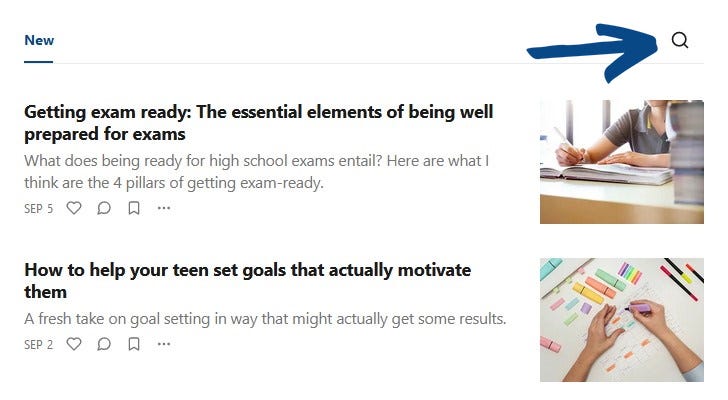How To Help Your Teen Not Have A Stress Meltdown During Exams
4 practical and realistic ways you can help your teen find some zen during their exam study.
A lot of teens the world over are either right in the thick of exams, or will be very soon.
Tis the season to be studying.
I don’t need to tell you that this means the Sesame Street word of the day is: stress.
So today I’m sharing some practical and actually realistic ways to help your teen keep their stress levels under control.
I’m not going to babble on today — let’s get straight into it.
Exams are stressful
First of all, can we please acknowledge that exams are frickin’ stressful. Let’s not pretend they’re a barrel of laughs and that we can just wish the stress away. Not gonna happen!
Yes studying can be satisfying, and it serves a longer term purpose, but when you are in the thick of exam prep, you’re not thinking, man this is the most fun I’ve had in ages.
If anything, pretending that you can just wish away the stress is just going to create more stress.
Much better to acknowledge, hey this is a tough time, but that’s totally normal and I’ll get through it.
Keeping perspective
As the grown up in the room, it’s your job to help bring some perspective to the situation.
As we’ve just covered, it is completely understandable that your teen is feeling stressed out about exams.
From their point of view, their entire time at school has revolved around exams, and now the time has come to actually sit those exams. It’s like everything they have done has lead up to this moment.
What’s more is your teen doesn’t have life-after-school experience like you do. Their entire living memory is school, and they can’t really have any idea what life might be like after school to help put the importance of school into perspective.
What I’m trying to say is, of course school is important, but it’s one important thing among lots of other important things in life, and the results your teen gets in these exams are unlikely to drastically alter their life trajectory.
They don’t need perfect grades
Society is somehow still perpetuating the idea that behind every university graduate is a straight A student.
This simply isn’t true.
Perfection does not need to be the goal. Exams are in fact designed so that not everyone can get a top grade.
And thankfully, a clean sweep of top grades isn’t required for pretty much every post school pathway.
It’s the general ‘trend’ of your teen’s exam scores that matters. If they are consistently failing tests and exams, then obviously that’s not good.
But it’s important not to get hung up on any one exam score.
If an exam doesn’t quite go according to plan, or is harder than they were expecting, it might feel really stressful at the time, but it’s honestly okay.
I didn’t get perfect grades at school or university, and neither does anyone else.
Studying smart
This applies to any teen preparing for exams; from those who have a study timetable prepped months in advance to those who, err, perhaps should have started studying a little earlier.
It may be a little sad but it’s true — when you have exams you have to play the game. You have to be a bit wiley (quick side bar — wiley seems to not actually be a word, but you get what I mean right?).
This requires three things.
1. Key topics vs peripheral topics
Firstly, it means focusing on the key topics of each subject rather than getting caught up in low-yield peripheral topics that might not even be examined on.
It’s the key topics that are most likely to come up in the exam and most likely to take up the most real estate on the exam paper.
If there’s time to study the nitty gritty then great — your teen can wow the examiner with those extra factoids that not everyone else will discuss, but if your teen is stressed out and worried they don’t have time to cover everything, it’s the key topics they should focus on.
Spending most of their exam study time on key topics will give your teen confidence that they are at least ready for the ‘big-ticket’ questions.
2. Thinking about the exam itself
Secondly, it means thinking about what the actual exam is going to be like — how long will it be, what types of questions are likely to come up, what questions are going to be worth the most marks.
Regardless of how prepared your teen is, these are questions your teen must ask themselves before every exam.
Even if they are last-minute cramming, it is a much better use of their precious time to make sure they leverage what they do know to scoop up as many marks as possible.
3. Past exams and practice questions
Thirdly, it’s essential that your teen looks at some past exam papers and does some practice questions before the real exam.
As I have discussed previously, this is essential because your teen needs to practice applying what they know to exam questions.
The exam isn’t going to ask them, write down everything you know about physics; it’s going to require them to apply what they know to answer specific exam questions.
The type of smart exam study covered in this last section is much more effective and time-efficient than trying to cover absolutely everything but not doing a good job of it, which has the excellent benefit of reducing stress.
Quality not quantity.
Exams are a tough time, there’s no way around that.
But with your help and support I know your teen can put their best foot forward while still being kind to themself and keeping a grip on reality.
Finally, I want to hear how it’s all going for your teen. Are they super stressed out? Is there anything they’re doing or you’re doing as a family that’s helping them get through it? Let’s discuss in the comments below.
Wishing your teen the very best of luck.
Clare x
P.S. For more help have a search through my Archive — whatever it is your teen needs help with during exam study, chances are I have written about it before. The search function (shown in the pic below) is really good for key words.




